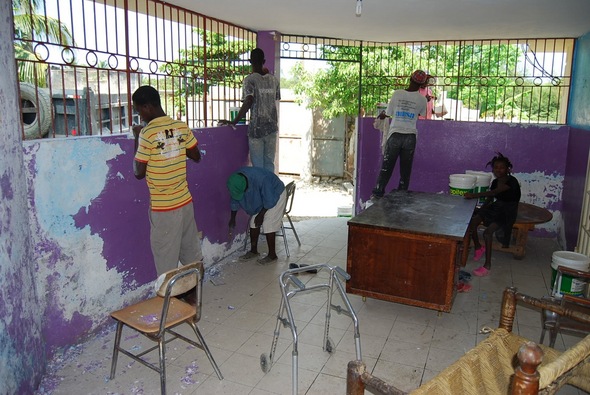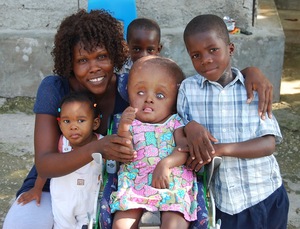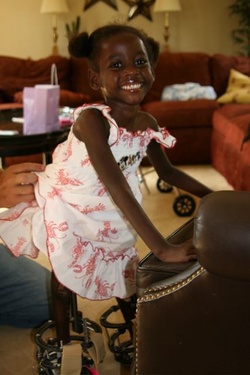Ann Arbor homebuilder takes up orphanage renovation cause in aftermath of Haiti earthquake

Local Haitians hired by the Haiti Orphan Rescue Program help complete the renovation of a distressed orphanage in Bon Repos, Haiti. Ann Arbor homebuilder Mike Mahon started the nonprofit organization in response to January's earthquake in Haiti.
Courtesy photo
Ann Arbor homebuilder Mike Mahon started going down to Haiti about 10 years ago with his father, a physician, and his brother, a prosthetics maker.
Over the years, Mahon says, they found different ways to put their helping hands to use in one of the poorest and least developed countries in the world.
Other members of Mahon's family — most of them in the health care business — have participated in various health clinics and volunteer missions in Haiti. His father, in particular, has spent the last four years visiting different orphanages.

The children who stay at the orphanage have varying backgrounds, including many with serious disabilities.
Courtesy photo
"We're tied to this country in so many ways," Mahon says. "And after the earthquake came, it just seemed like our ties and roots just went that much deeper into what it is that we really need to do to be helpful. Because we've been there, we know the roads, we know the cities, we know the people, we know some of the language, and we know that we can help."
Mahon, owner of a custom home and renovation company called Adaptive Building Solutions LLC, decided to go back to Haiti after the worst earthquake the region had seen in more than 200 years struck in January, killing hundreds of thousands of people and causing billions of dollars in damage.
"We were obviously very anxious to go down there and check on everybody after having created this relationship with these orphanages, so I went down with my dad and one of the medical assistants from his clinic and we were busy," he said. "We had to fly in to the Dominican Republic and drive over the mountains to get in. It was a little bit chaotic and things were pretty disrupted."
That was Feb. 1, three weeks after the earthquake. Mahon says he realized this time around he wanted to do something more than he had done in past visits.
"I quickly started to look for ways that I could help this circuit of orphanages from a building perspective," he said. "And so upon visiting these different orphanages, I noticed that they had something in common: They were all distressed, they were all rundown."
Mahon says he found homes originally built for families of six to eight people being occupied by 25 to 30 people. At a typical orphanage, that might include 20 to 25 children and then staff, he said.
"What I was finding was that the director spends just as much time handling building and maintenance issues — and usually not very effectively — as they do spending time trying to get resources for food, for medical care, and doing the things that they need to do to take care of the children," Mahon said. "So the care is being compromised."
On his way back home, Mahon came up with the idea for a nonprofit organization called the Haiti Orphan Rescue Program, which would renovate the orphanages.
Mahon met a woman who took an interest in the concept and put him in touch with Michael Rath, a custom home builder from Breckenridge, Colo. The two forged a phone friendship and — along with Mahon's wife and Rath's fiance — spent three months working out a plan.
They launched a website, www.haitiorphanrescue.org, and were successful at raising $10,000, which was the target to complete the first renovation of an orphanage in Bon Repos, Haiti.
"We were able to get in and do something quickly and have a positive effect without having to cut through a lot of red tape," says Mahon, who recently returned from the trip. "We're a low-cost, high-impact operation that really has a quick positive effect on giving them a fresh start."
Rather than putting a bunch of building materials and tools into a shipping container and flying a dozen volunteers down at $1,500 apiece, Mahon and Rath have set up a business model whereby they fly to Haiti themselves, buy local materials and hire local Haitians to do the work.
"Our operation now has a double positive effect," Mahon says. "We obviously improve the quality of life of the kids and the caregivers at the orphanage, and we put food on the table for 20 to 25 guys who otherwise aren't working in Haiti right now."

Melissa Eger, 7, was adopted from an orphanage in Haiti. Born with arthrogryposis, she has gone through extensive physical therapy and can walk now.
Courtesy photo
Mahon says the biggest difference between orphanages in the U.S. and Haiti is that relatively few Haitian children actually are adopted.
"There are an estimated 350,000 orphans in Haiti," he said. "Before the earthquake, in 2009, less than 2,000 children were adopted. That's why there is such a great need for outside help. While billions of dollars go in to repair the infrastructure and million dollar building contracts, we are afraid that the orphanages are going to be the last in line."
Mahon actually chose the first orphanage because of a personal connection his family made there three years ago. That's when they learned of a young Haitian girl named Melissa who had arthrogryposis and was abandoned by her birth mother.
Mahon describes Melissa as a bubbly young girl who had a perfectly functioning brain and personality — she just couldn't use her legs. But she quickly learned to crawl around on her hands, and she made friends with the 18 or 20 children in the orphanage.
Mahon's sister, Lory Eger of Grosse Pointe, who works through an international healing charity, found out about Melissa and raised funding to have her brought to the United States on a medical visa to have her legs operated on and put in braces. She went through intensive physical therapy.
Melissa since has been adopted by Eger. Now 7 years old, the family is happy to report that Melissa just recently took her first steps. And now the orphanage, which Mahon just finished renovating, is officially called Melissa's Hope Orphanage.
"It's unbelievable," Eger says of what her brother is doing in Haiti. "It means a lot to us because you obviously can't go back and help all the children, but for the kids who have to stay there he's really making a difference."
Mahon says he's raising funds for the next five prospective renovation projects. Those range in cost from $5,000 to $10,000.
"We know that for $5,000 we can do a basic renovation to an orphanage," he says. "Which is basically we're going to go in, sanitize the entire orphanage, replace sinks and toilets, fresh paint inside and out, and the rest of it really comes down to space management, creating proper storage solutions, taking a look at rooms and saying: Are we really using this room to the best functional ability?"
For $10,000, more extensive work can be done. That includes adding features like independent power, such as a generator, or installing a satellite dish for Internet access, giving the orphanage a better connection to the outside world.
Mahon and his partner also are introducing sustainable green building techniques to the orphanage renovation process because that's what they do. Mahon's building company is one of the four local firms showcasing LEED Platinum homes in the upcoming Ann Arbor Green Homes Tour being held in conjunction with the mayor's Green Fair the weekend of June 11-13. The home tour is going to contribute all proceeds to three builder charities, one of which is the Haiti Orphan Rescue Program.
Already after his first renovation project in Haiti, Mahon, who talks passionately about his work, has an album filled with pictures and lots of stories to share of the children and orphanage workers.
"It's very personal. It's not just show up, do the makeover, and leave," he says. "They become our friends."
Ryan J. Stanton covers government for AnnArbor.com. Reach him at ryanstanton@annarbor.com or 734-623-2529.


Comments
PeterNow
Mon, Jun 7, 2010 : 9:58 a.m.
The BRAG Ann Arbor salutes HORP's efforts! Anyone who can contribute financially can easily do so on their website: http://haitiorphanrescue.org/ Also, more info on the June 11 - 13 LEED Home Tour that will be raising funds to support HORP and other charities can be found online at http://www.greenhomestourmi.org/
Top Cat
Sun, Jun 6, 2010 : 6:53 p.m.
sh1...since you asked...this is my favorite.... http://saydetroit.org/saydetroitorg/aholeintheroof/ God Bless all that give to help other.
sh1
Sun, Jun 6, 2010 : 6:43 p.m.
Very moving story. Topcat, when your Detroit charity is up and running, let us know.
Top Cat
Sun, Jun 6, 2010 : 6:19 p.m.
Why does the need of people in Haiti take precedence over the need of people in Detroit? Charity begins at home. Our own people should come first. But God Bless them for their spirit of giving.
Betsy de Parry
Sun, Jun 6, 2010 : 5:06 p.m.
Kudos to Mike and all who are involved in this very worthwhile project. Thanks for reporting it, Ryan.